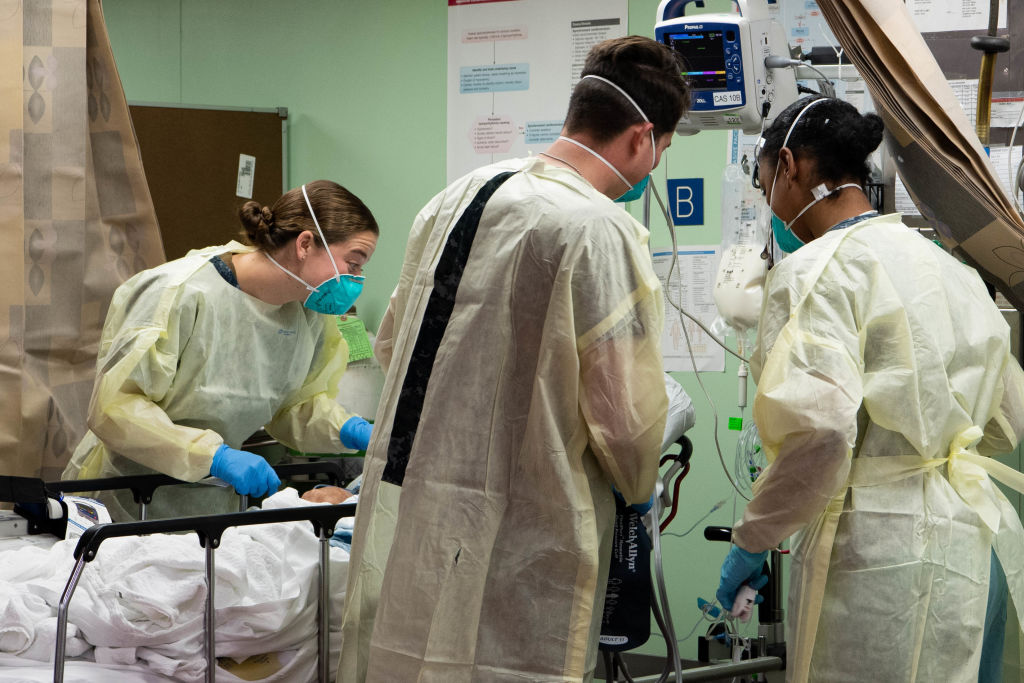Researchers warn 'the devil is already here' after analysis of California COVID-19 variant


A free daily email with the biggest news stories of the day – and the best features from TheWeek.com
You are now subscribed
Your newsletter sign-up was successful
Researchers in California are expressing concern over a COVID-19 variant in the state, which the Los Angeles Times reports appears "increasingly dangerous."
Scientists from the University of California, San Francisco examined the B.1.427/B.1.429 COVID-19 variant spreading in California, and they say that it "not only spreads more readily than its predecessors, but also evades antibodies generated by COVID-19 vaccines or prior infection and it's associated with severe illness and death," the Los Angeles Times writes.
The researchers warned that the variant should be viewed as a "variant of concern" like others from the United Kingdom, South Africa and Brazil.
The Week
Escape your echo chamber. Get the facts behind the news, plus analysis from multiple perspectives.

Sign up for The Week's Free Newsletters
From our morning news briefing to a weekly Good News Newsletter, get the best of The Week delivered directly to your inbox.
From our morning news briefing to a weekly Good News Newsletter, get the best of The Week delivered directly to your inbox.
"The devil is already here," warned Dr. Charles Chiu, who led the new analysis. "I wish it were different. But the science is the science."
The California strain reportedly appears to reduce the effect of neutralizing antibodies by a factor of two, compared to a factor of 6.2 for the South Africa strain. The study also suggests it "could have greater virulence," the Times writes, noting the researchers looked at 324 hospitalized patients' medical charts and found that those infected with the B.1.427/B.1.429 variant were more likely to be admitted to the ICU, as well as more likely to die. Still, Chiu said this could potentially be a result of hospitals being overwhelmed due to the increased transmissibility of the variant, rather than the variant itself being more deadly.
Separately, another study that hasn't yet been published pointed to a "modest, but meaningful, difference" of almost 10 percent in the chance of becoming infected if a household member has the B.1.427/B.1.429 variant versus another variant, The New York Times reports.
At the same time, cardiologist Eric Topol on Tuesday pushed back on labeling the California variant "increasingly dangerous" at this stage, noting, "there isn't even a preprint published and we're watching dramatic descent in cases, hospitalization and deaths despite its high frequency." California's and San Francisco County's public health departments are reportedly reviewing the new analysis.
A free daily email with the biggest news stories of the day – and the best features from TheWeek.com
Brendan worked as a culture writer at The Week from 2018 to 2023, covering the entertainment industry, including film reviews, television recaps, awards season, the box office, major movie franchises and Hollywood gossip. He has written about film and television for outlets including Bloody Disgusting, Showbiz Cheat Sheet, Heavy and The Celebrity Cafe.
-
 6 exquisite homes with vast acreage
6 exquisite homes with vast acreageFeature Featuring an off-the-grid contemporary home in New Mexico and lakefront farmhouse in Massachusetts
-
 Film reviews: ‘Wuthering Heights,’ ‘Good Luck, Have Fun, Don’t Die,’ and ‘Sirat’
Film reviews: ‘Wuthering Heights,’ ‘Good Luck, Have Fun, Don’t Die,’ and ‘Sirat’Feature An inconvenient love torments a would-be couple, a gonzo time traveler seeks to save humanity from AI, and a father’s desperate search goes deeply sideways
-
 Political cartoons for February 16
Political cartoons for February 16Cartoons Monday’s political cartoons include President's Day, a valentine from the Epstein files, and more
-
 Trump HHS slashes advised child vaccinations
Trump HHS slashes advised child vaccinationsSpeed Read In a widely condemned move, the CDC will now recommend that children get vaccinated against 11 communicable diseases, not 17
-
 FDA OKs generic abortion pill, riling the right
FDA OKs generic abortion pill, riling the rightSpeed Read The drug in question is a generic version of mifepristone, used to carry out two-thirds of US abortions
-
 RFK Jr. vaccine panel advises restricting MMRV shot
RFK Jr. vaccine panel advises restricting MMRV shotSpeed Read The committee voted to restrict access to a childhood vaccine against chickenpox
-
 Texas declares end to measles outbreak
Texas declares end to measles outbreakSpeed Read The vaccine-preventable disease is still spreading in neighboring states, Mexico and Canada
-
 RFK Jr. shuts down mRNA vaccine funding at agency
RFK Jr. shuts down mRNA vaccine funding at agencySpeed Read The decision canceled or modified 22 projects, primarily for work on vaccines and therapeutics for respiratory viruses
-
 Measles cases surge to 33-year high
Measles cases surge to 33-year highSpeed Read The infection was declared eliminated from the US in 2000 but has seen a resurgence amid vaccine hesitancy
-
 Kennedy's vaccine panel signals skepticism, change
Kennedy's vaccine panel signals skepticism, changeSpeed Read RFK Jr.'s new vaccine advisory board intends to make changes to the decades-old US immunization system
-
 Kennedy ousts entire CDC vaccine advisory panel
Kennedy ousts entire CDC vaccine advisory panelspeed read Health Secretary RFK Jr. is a longtime anti-vaccine activist who has criticized the panel of experts
